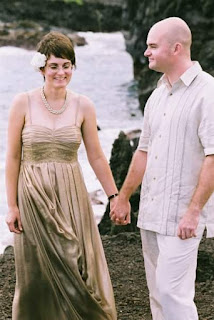Risk-taking? Me??
 |
| definitely not me! |
I don't think so. No heroic stories here of trekking through jungles to bring medical aid, or smuggling Bibles into hostile countries, or mentoring malnourished children in a deprived inner-city area.
The idea of taking risks reminded me of some thoughts I had about the story of Ruth. Ruth was the daughter-in-law of Naomi, and Naomi's family had moved from Judah to Moab to escape famine. (This is way back in Old Testament times, you understand - probably about 1300 BC.) Naomi's two sons had married local women, and everything was going fine, when suddenly Naomi's husband and both sons died, within a fairly short space of time. Naomi, understandably, was heartbroken, and decided to return to her homeland. Both daughters-in-law accompanied her a short way, but Orpah went home, while Ruth followed Naomi, pledging her devotion in a famous speech ("your people will be my people, and your God my God").
Most talks you hear about Ruth emphasise how difficult this must have been for her - leaving her home country and family, going to an unknown land - how brave! how dedicated! how selfless!
 |
| Study for Ruth Gathering Wheat by Edwin Long |
But, you know, some decisions almost make themselves. They might look brave and dedicated on the outside, but they don't feel like that on the inside. When I met Graham, we lived in the same city for a few months, and then he announced he had just been offered a job in Texas. The next stage of our relationship was mostly conducted by trans-Atlantic phone call, but when he proposed and I decided to move out and join him, it simply felt like the obvious thing to do.
Looking back, I can totally understand why some of my friends were a little concerned. And of course, it wasn't entirely easy. Graham still occasionally teases me about the fact that when the plane landed, I was crying about leaving my housemate's pet rabbit! Not to mention the housemate herself, with whom I had shared a house for five years - I would return to the UK at Christmas to celebrate her wedding, too. But the decision itself didn't feel like a big risky leap into the unknown. It felt like the next step on the path. Maybe it was like that for Ruth, too.
 |
| gratuitous wedding photo |
So risk-taking is a funny concept. Something can look risky but not feel it. Or it may feel like a huge risk, but to other people it seems like nothing. Robert Schnase starts his chapter with the story of a couple who became curious about where all the homeless people went to. After some enquiry they found out that they tended to congregate under a certain highway bridge, so the couple went there and started a monthly worship service.
Schnase uses this as an example of risk-taking mission - and from the outside, it certainly is. But I can imagine that for the couple involved, it may have just been the next obvious step to take.
Further on, Schnase asks us to consider the question, "What have I done that I would not have done if it were not for my relationship with Christ?" That's an interesting one when you've been a Christian all your life! Most of these opportunities came through church or a Christian organisation, but I honestly don't know if I would have looked for similar ways to volunteer if I wasn't a Christian, or just not thought about it at all. When I look back over my life, I have:
- Visited a church in Romania to help with their summer holiday activities
- Sat at Bristol bus station to welcome international students to the university
- Volunteered at a group for teenage mothers
- Run a cooking club based around Christian festivals for primary school children
- Attempted to teach Bible stories to 3- to 5-year-olds
- Helped to lead a playgroup
- Delivered cakes to elderly and isolated people over lockdown
- Started volunteering at a debt clinic
So that's actually quite a lot of different people and activities - with a certain bias towards cooking and children, it seems - but while there were definitely some difficult moments in there, I don't recall any of those feeling risky. Hopefully, despite that, they were helpful to the people involved, and communicated Jesus' love to some degree.
I guess where I'm trying to get to, is that it's easy to feel inadequate when we talk about risk-taking mission and service - or indeed any mission and service. We assume we're not doing it properly if we haven't faced imprisonment, or gone to live with lepers, or something.
But maybe it's more about keeping our eyes and hearts open, and doing what seems like the obvious thing to do. And who knows, we may find we've inadvertently taken some risks after all.
Comments